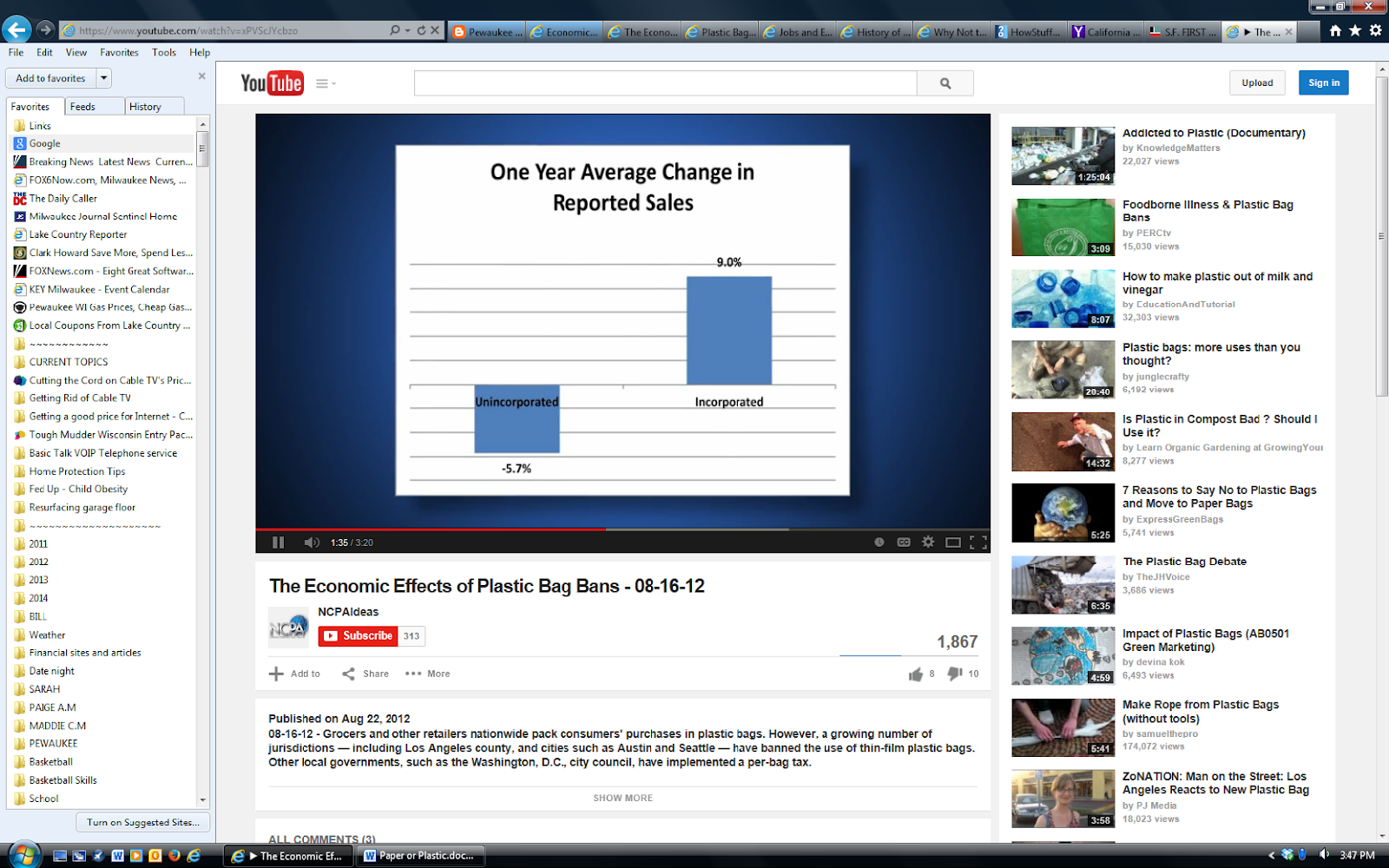Paper or Plastic?
Paige Mertens
Mr. Reuter
Economics
September 7, 2014
Paper or Plastic?
I work at a local Pick N Save as a cashier. Each time a customer checks out, the bagger will ask, “Paper or plastic?” In the “old days” customers had one choice for packing their groceries; a paper bag. In the 70’s a new option became available in the form of a plastic bag. Past or present, the choice at the grocery store is paper or plastic.
Plastic bags are a less expensive fixed cost to grocery stores. These bags have less production costs over paper bags. Additionally paper bag manufacturing uses many of our natural resources including trees, and water. The process of making paper also emits a great deal of pollution. All these factors increase the cost of the bag.
Initially the plastic bag was thought to be a great, cost savings option for grocery stores, and in turn shoppers. Over time, concerns arose about plastic bags arose as well. Plastic bags were also found not to be good for the enviromment. Not only did people litter with them, but this littering was dangerous to animals. One of the biggest concerns with plastic bags is the inability to effectively recycle the bags. A plastic bag can take at least 500 years to biodegrade, filling landfills.
In July, 2011 Los Angeles County’s, “bag ban” went into effect. Stores could not use plastic bags for groceries, but instead could sell the shopper a paper bag at a cost of 10 cents, sell the shopper a reusable bag, or the shopper could bring in their own bag. A year later through a You Tube video, Pam Villareal from the National Center for Policy Analysis, outlined the economic impact of the ban. The ban did not affect all stores within LA County. Therefore some shoppers choose to continue to go to stores where plastic bags were in use (incorprated), and paper bags were not a charge:

The analysis showed that stores with the plastic bag ban saw a drop in revenue of 5.7%, and staffing decrease/job loss of 10.4%. In contrast the stores without the ban had increased sales/gains of 9%, and increase job growth of 2.5%. Another unexpected cost to the stores was an increased number of lost and/or stolen carts and baskets. Apparently shoppers “borrowed” these items to help get their groceries home. Perhaps a positive aspect of the bag ban for stores in revenue generations to help cover the cost of the bags, and through selling reusable bags. Despite economic concerns over the bag ban, this week the Governor of California announced his plans to sign a bill banning plastic bags throughout California.
Who would ever have thought the decision between paper or plastic would be such a difficult one? As you consider the question, you must think about the environment as well as your personal beliefs. Production of plastic and paper bags use several valuable environmental resources including trees, water, petrolium. Each plastic bag we send to a landfill will stay in that land fill until our great, great, great, great, great, great grandchild is born.
As someone that values the environment, I personally feel that I can easily purchase and use reusable bags for all my shopping needs. The choice is yours. Next time you are asked, “Paper or plastic,” reflect on your personal beliefs and perhaps your answer will be, “Neither. I brought my own bag.”
McGrath, Jane. howstuffworks. n.d. 7 9 2014 <http://science.howstuffworks.com/environmental/green-science/paper-plastic1.htm>.
Yahoo! News. 5 9 2014. 6 9 2014 <http://news.yahoo.com/california-first-us-state-ban-plastic-bags-064643573.html>.
You Tube. 22 8 2012. 6 9 2014 <https://www.youtube.com/watch?v=xPVScJYcbzo>.
0 Response to "Paper or Plastic?"
Post a Comment